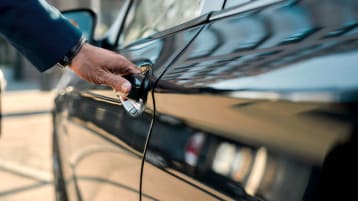Mystery Shopping
Allied Consumers Research GroupFind BBB Accredited Businesses in Mystery Shopping.
About
This business has 1 alert
Important information
- Additional Info:This firm sends consumers a check to do mystery shopping. As a matter of general information regarding this offer, BBB provides the following information.
Tips for Recognizing and Avoiding Fake Check Scams
1.If someone you don't know wants to pay you by check but wants you to wire some of the money back, beware! It's a scam that could cost you thousands of dollars.
2.There are many variations of the fake check scam. It could start with someone offering to buy something you advertised, pay you to do work at home, give you an "advance" on a sweepstakes you've supposedly won, or pay the first installment on the millions that you'll receive for agreeing to have money in a foreign country transferred to your bank account for safekeeping. Whatever the pitch, the person may sound quite believable.
3.Fake check scammers hunt for victims. They scan newspaper and online advertisements for people listing items for sale, and check postings on online job sites from people seeking employment. They place their own ads with phone numbers or email addresses for people to contact them. And they call or send emails or faxes to people randomly, knowing that some will take the bait.
4.They often claim to be in another country. The scammers say it's too difficult and complicated to send you the money directly from their country, so they'll arrange for someone in the U.S. to send you a check.
5.They tell you to wire money to them after you've deposited the check. If you're selling something, they say they'll pay you by having someone in the U.S. who owes them money send you a check. It will be for more than the sale price; you deposit the check, keep what you're owed, and wire the rest to them. If it's part of a work-at-home scheme, they may claim that you'll be processing checks from their "clients." You deposit the checks and then wire them the money minus your "pay." Or they may send you a check for more than your pay "by mistake" and ask you to wire them the excess. In the sweepstakes and foreign money offer variations of the scam, they tell you to wire them money for taxes, customs, bonding, processing, legal fees, or other expenses that must be paid before you can get the rest of the money.
6.The checks are fake but they look real. In fact, they look so real that even bank tellers may be fooled. Some are phony cashiers checks, others look like they're from legitimate business accounts. The companies whose names appear may be real, but someone has dummied up the checks without their knowledge.
7.You don't have to wait long to use the money, but that doesn't mean the check is good. Under federal law, banks have to make the funds you deposit available quickly - usually within one to five days, depending on the type of check. But just because you can withdraw the money doesn't mean the check is good, even if it's a cashier's check. It can take weeks for the forgery to be discovered and the check to bounce.
8.You are responsible for the checks you deposit. That's because you're in the best position to determine the risk - you're the one dealing directly with the person who is arranging for the check to be sent to you. When a check bounces, the bank deducts the amount that was originally credited to your account. If there isn't enough to cover it, the bank may be able to take money from other accounts you have at that institution, or sue you to recover the funds. In some cases, law enforcement authorities could bring charges against the victims because it may look like they were involved in the scam and knew the check was counterfeit.
9.There is no legitimate reason for someone who is giving you money to ask you to wire money back. If a stranger wants to pay you for something, insist on a cashiers check for the exact amount, preferably from a local bank or a bank that has a branch in your area.
10.Don't deposit it - report it! Report fake check scams to NCL's Fraud Center, at www.fraud.org. That information will be transmitted to the appropriate law enforcement agencies.
This firm sends consumers a check to do mystery shopping. As a matter of general information regarding this offer, BBB provides the following information.
Tips for Recognizing and Avoiding Fake Check Scams
1.If someone you don't know wants to pay you by check but wants you to wire some of the money back, beware! It's a scam that could cost you thousands of dollars.
2.There are many variations of the fake check scam. It could start with someone offering to buy something you advertised, pay you to do work at home, give you an "advance" on a sweepstakes you've supposedly won, or pay the first installment on the millions that you'll receive for agreeing to have money in a foreign country transferred to your bank account for safekeeping. Whatever the pitch, the person may sound quite believable.
3.Fake check scammers hunt for victims. They scan newspaper and online advertisements for people listing items for sale, and check postings on online job sites from people seeking employment. They place their own ads with phone numbers or email addresses for people to contact them. And they call or send emails or faxes to people randomly, knowing that some will take the bait.
4.They often claim to be in another country. The scammers say it's too difficult and complicated to send you the money directly from their country, so they'll arrange for someone in the U.S. to send you a check.
5.They tell you to wire money to them after you've deposited the check. If you're selling something, they say they'll pay you by having someone in the U.S. who owes them money send you a check. It will be for more than the sale price; you deposit the check, keep what you're owed, and wire the rest to them. If it's part of a work-at-home scheme, they may claim that you'll be processing checks from their "clients." You deposit the checks and then wire them the money minus your "pay." Or they may send you a check for more than your pay "by mistake" and ask you to wire them the excess. In the sweepstakes and foreign money offer variations of the scam, they tell you to wire them money for taxes, customs, bonding, processing, legal fees, or other expenses that must be paid before you can get the rest of the money.
6.The checks are fake but they look real. In fact, they look so real that even bank tellers may be fooled. Some are phony cashiers checks, others look like they're from legitimate business accounts. The companies whose names appear may be real, but someone has dummied up the checks without their knowledge.
7.You don't have to wait long to use the money, but that doesn't mean the check is good. Under federal law, banks have to make the funds you deposit available quickly - usually within one to five days, depending on the type of check. But just because you can withdraw the money doesn't mean the check is good, even if it's a cashier's check. It can take weeks for the forgery to be discovered and the check to bounce.
8.You are responsible for the checks you deposit. That's because you're in the best position to determine the risk - you're the one dealing directly with the person who is arranging for the check to be sent to you. When a check bounces, the bank deducts the amount that was originally credited to your account. If there isn't enough to cover it, the bank may be able to take money from other accounts you have at that institution, or sue you to recover the funds. In some cases, law enforcement authorities could bring charges against the victims because it may look like they were involved in the scam and knew the check was counterfeit.
9.There is no legitimate reason for someone who is giving you money to ask you to wire money back. If a stranger wants to pay you for something, insist on a cashiers check for the exact amount, preferably from a local bank or a bank that has a branch in your area.
10.Don't deposit it - report it! Report fake check scams to NCL's Fraud Center, at www.fraud.org. That information will be transmitted to the appropriate law enforcement agencies.
BBB Business Profiles may not be reproduced for sales or promotional purposes.
BBB Business Profiles are provided solely to assist you in exercising your own best judgment. BBB asks third parties who publish complaints, reviews and/or responses on this website to affirm that the information provided is accurate. However, BBB does not verify the accuracy of information provided by third parties, and does not guarantee the accuracy of any information in Business Profiles.
When considering complaint information, please take into account the company's size and volume of transactions, and understand that the nature of complaints and a firm's responses to them are often more important than the number of complaints.
BBB Business Profiles generally cover a three-year reporting period. BBB Business Profiles are subject to change at any time. If you choose to do business with this business, please let the business know that you contacted BBB for a BBB Business Profile.
As a matter of policy, BBB does not endorse any product, service or business. Businesses are under no obligation to seek BBB accreditation, and some businesses are not accredited because they have not sought BBB accreditation. BBB charges a fee for BBB Accreditation. This fee supports BBB's efforts to fulfill its mission of advancing marketplace trust.

